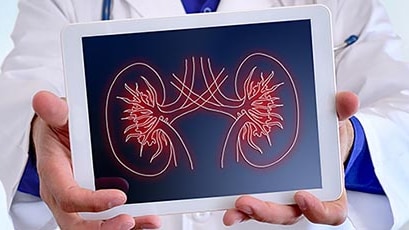Key points
- Post-streptococcal glomerulonephritis (PSGN) is an inflammatory disease affecting the kidneys.
- It's rare, but PSGN can develop after strep throat, scarlet fever, or impetigo.
- Symptoms of PSGN usually point to kidney issues and long-term kidney damage can occur.
- Treatment usually focuses on managing swelling and blood pressure but can include antibiotics.

What it is
PSGN is a kidney disease that is thought to be an immune response to an earlier bacterial infection.
As the body's defense system, the immune system is important in fighting off infections. But the immune system can mistakenly attack healthy parts of the body and cause damage.
Symptoms
After strep throat or scarlet fever symptoms start: PSGN can develop about 10 days later.
After impetigo symptoms start: PSGN can develop about 3 weeks later.
Someone with PSGN usually has protein in the urine and hypertension (high blood pressure). Symptoms can also include:
- Dark, reddish-brown urine
- Decreased need to pee or decreased amount of urine
- Edema (swelling)
- Fatigue due to anemia (feeling tired due to low blood iron levels)
The swelling occurs especially in the face, around the eyes, and in the hands and feet.
Some people may have no symptoms or symptoms that are so mild that they don't seek medical help.
Complications
Most people who develop PSGN recover within a few weeks without any complications. While rare, long-term kidney damage, including kidney failure, can occur. These rare complications are more common in adults than children.
Risk factors
Anyone can get PSGN after having strep throat, scarlet fever, or impetigo. People at increased risk for those infections are also at increased risk for getting PSGN.
Age
PSGN is more common in children than adults.
After strep throat or scarlet fever
Developing PSGN after strep throat or scarlet fever is most common in young, school-age children.
After impetigo
Developing PSGN after impetigo is most common in preschool-age children.
Causes
PSGN can develop after infections caused by group A Streptococcus (group A strep bacteria), specifically:
PSGN is not a group A strep infection of the kidneys. Instead PSGN results from the body's immune system fighting off strep throat, scarlet fever, or impetigo.
Spread to others
People cannot catch PSGN from someone else. However, if someone with PSGN is still infected with group A strep bacteria, they can spread the bacteria to others. Group A strep bacteria are contagious.
Prevention
The main way to prevent PSGN is to prevent group A strep infections like strep throat, scarlet fever, and impetigo.
Testing and diagnosis
Healthcare providers can diagnose PSGN in a number of ways, including
- Looking at a patient's medical history
- Testing urine samples to look for protein and blood
- Ordering blood tests to see how well the kidneys are working
- Testing to see if the patient recently had a group A strep infection
Treatment and recovery
Treatment of PSGN focuses on managing symptoms as needed. Healthcare providers limit salt and water intake or prescribe a diuretic to decrease swelling. A diuretic is a medicine that increases the flow of urine.
Healthcare providers prescribe blood pressure medicine to manage the patient's blood pressure.
Antibiotics
People with PSGN who still have a group A strep infection are often given antibiotics.
